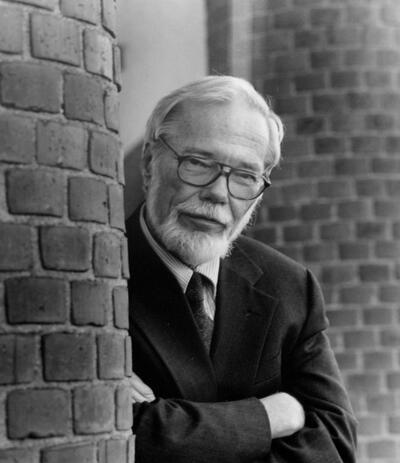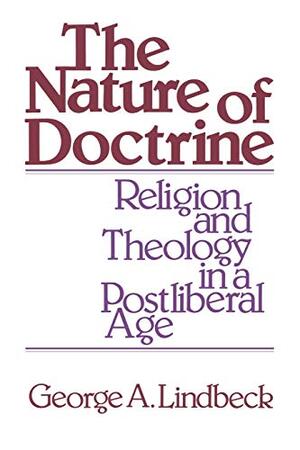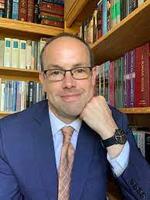By Peter J. Thuesen
 This month would have been the 100th birthday of the Yale theologian George Lindbeck (1923-2018), whose work was formative for how I think about religion. His 1984 book The Nature of Doctrine was a revelation to me when I read it as a rising college senior. At that time, I never imagined I would get to know him personally.
This month would have been the 100th birthday of the Yale theologian George Lindbeck (1923-2018), whose work was formative for how I think about religion. His 1984 book The Nature of Doctrine was a revelation to me when I read it as a rising college senior. At that time, I never imagined I would get to know him personally.
In the summer of 1992 at the University of North Carolina at Chapel Hill, I was preparing to write a senior honors thesis on conflict in the Evangelical Lutheran Church in America. Though the denomination was barely four years old, conservatives and liberals were already at each other throats over issues like homosexuality and ecumenical relations with non-Lutherans. Conservatives, convinced that the ELCA had abandoned fidelity to confessional and biblical truth, would eventually form breakaway denominations, reversing decades of progress toward Lutheran unity.
I found the strife in the ELCA disillusioning. Having grown up in Lutheranism’s liberal wing, I took for granted that church unity was a higher goal than doctrinal purity, and I wanted nothing to do with biblical literalism on sexuality. At the same time, I understood the conservatives’ fear of losing a distinctive Lutheran identity. Was it possible, I wondered, to remain a “traditional” Lutheran without succumbing to biblical or theological fundamentalism?
Then I read Lindbeck’s Nature of Doctrine. Like Lindbeck himself, the book was erudite and unflashy. Its signal contribution was to push beyond the prevailing options toward a different way of thinking about religion. On the one hand, Lindbeck rejected the liberal tradition, associated with Schleiermacher, that made individual experience the starting point of theology. On the other hand, Lindbeck repudiated the “cognitive-propositional” view, commonly associated with conservatism, that religion is about objective truths that can be stated with certainty.
 Lindbeck argued instead for a “cultural-linguistic” alternative: religions are like languages, and their doctrines like grammatical rules. One becomes conversant in a religious tradition the same way one learns to speak a language—through gradual socialization and practice. To Lindbeck, this view made sense of the way the world really works, first by tempering the liberal confidence in the priority of pure experience. As he wrote, “it is necessary to have the means for expressing an experience in order to have it, and the richer our expressive or linguistic system, the more subtle, varied, and differentiated can be our experiences.” At the same time, Lindbeck corrected the conservative error that absolute truth is fully knowable in this life. Our manner of speaking about God may or may not correspond to the way God is. To use a Christian example, the Trinity is a manner of speaking about God in the same way that idioms function in everyday speech. But other religions have different idioms, and no language has complete access to unmediated truth.
Lindbeck argued instead for a “cultural-linguistic” alternative: religions are like languages, and their doctrines like grammatical rules. One becomes conversant in a religious tradition the same way one learns to speak a language—through gradual socialization and practice. To Lindbeck, this view made sense of the way the world really works, first by tempering the liberal confidence in the priority of pure experience. As he wrote, “it is necessary to have the means for expressing an experience in order to have it, and the richer our expressive or linguistic system, the more subtle, varied, and differentiated can be our experiences.” At the same time, Lindbeck corrected the conservative error that absolute truth is fully knowable in this life. Our manner of speaking about God may or may not correspond to the way God is. To use a Christian example, the Trinity is a manner of speaking about God in the same way that idioms function in everyday speech. But other religions have different idioms, and no language has complete access to unmediated truth.
Lindbeck had grown up encountering other idioms. The son of Swedish-American Lutheran missionaries, he was born on March 10, 1923, in Luoyang, China, where he lived until age 17. Historian David Hollinger cites Lindbeck as an example of “missionary cosmopolitans”: Americans reared in a missionary context who brought a broad-minded, global outlook back to the States. Indeed, Lindbeck would dedicate his entire career to ecumenism. After earning his Ph.D. at Yale and joining the faculty of the Divinity School there, he was named a delegated observer from the Lutheran World Federation to the Second Vatican Council. The influence of this experience is evident in The Nature of Doctrine, where he proposes that non-Catholics need not entirely dissent from papal infallibility if understood as the claim that the church does not violate the grammar of its own faith.
Lindbeck’s critics were quick to pounce on his grammatical view of doctrine as relativistic. His fellow Lutheran Carl Braaten charged that the “neopragmatism” of Lindbeck and his Yale colleague Hans Frei sacrificed truth for fidelity. And the Lutheran-turned-Catholic Richard John Neuhaus wrote that average believers who affirm religious doctrines do not think they are engaging in a grammatical exercise: “Paul, Luther, and Mrs. May at St. Paul’s Lutheran think they are asserting the way reality really is.”
The criticisms belied Lindbeck’s own traditional piety. I had the good fortune to learn to know him in my first year of graduate school at Princeton University during his visiting appointment as the Virginia and Richard Stewart Lecturer. Perhaps because he took pity on a fellow Lutheran, he agreed to supervise a directed readings course for me. We often met for lunch at Forbes College, the undergraduate residential community where he had an apartment. I remember seeing in his living room a well-worn Lutheran breviary, evidence of his daily devotional regimen. He even invited me to be his guest to hear the German theologian Wolfhart Pannenberg deliver the 1994 Erasmus Lecture in New York City. At dinner at the Waldorf Astoria after the lecture, we sat at the head table with the event’s host, Richard John Neuhaus.
That Lindbeck moved effortlessly between the conservative constituency of Neuhaus’s magazine First Things and the secular liberals at universities like Princeton was a testament not only to his unassuming personality but also to the power of his cultural-linguistic view of religion for preserving traditionalism even while allowing for agnosticism.
I doubt Lindbeck was agnostic in his heart of hearts. In the section on truth in The Nature of Doctrine, he uses the term only once. But for me, his methodological agnosticism was liberating. It freed me from the notions that truth must be absolutely knowable and that there is only one legitimate doctrinal language for describing it. Though I’ve come to think that Lindbeck shortchanged experience—I’m enough of a mystic to believe that something like an unmediated experience of the divine is possible—I’ve remained a Lindbeckian in my understanding of religious truth.
This Lindbeckian commitment has opened new religious worlds to me. After marrying an Episcopalian, I left the ELCA and joined the Episcopal Church, a small step to outsiders but a big deal to one so thoroughly Lutheran. The Episcopal Church’s Book of Common Prayer is a prime example of the expressive richness that Lindbeck wrote about. On the professional front, a bigger leap was my embrace of the Latter-day Saints as an area of teaching and research. Lindbeck’s cultural-linguistic theory of religion has helped me appreciate the wisdom of Mormon theology as a religious idiom. Most recently, my research has turned to Catholicism, Lindbeck’s great ecumenical interest. I’m now writing a biography of Richard Cardinal Cushing (1895-1970), who embodied the Vatican II ideal that Lindbeck so championed. (Cushing is said to have complained, with typical tongue in cheek, that the delegated observers to the council, Lindbeck among them, were treated better in Rome than he was.)
To its critics, Lindbeck’s cultural-linguistic theory is better suited to religious studies than to Christian theology, which makes hard truth claims. Undoubtedly that’s one reason Lindbeck’s theory is so amenable to my work as a historian of American religion in a secular department of religious studies. But Lindbeck also speaks to me as a person of faith. In the three decades since I read The Nature of Doctrine, I’ve become ever more convinced that for all we lose in propositional truth, we gain in imaginative richness.
Bibliographical Note
George A. Lindbeck, The Nature of Doctrine: Religion and Theology in a Postliberal Age (Philadelphia: Westminster Press, 1984), quotation about experience, 37; on papal infallibility, 98-99; on the “agnostic” view of truth, 67. The Nature of Doctrine is also available in a 25th anniversary edition (Westminster, 2009) that includes a bibliography of works by and about Lindbeck. David A. Hollinger, Protestants Abroad: How Missionaries Tried to Change the World But Changed America (Princeton, N.J.: Princeton University Press, 2017), 108. Carl E. Braaten, No Other Gospel! Christianity among the World’s Religions (Minneapolis: Fortress Press, 1992), 19. Richard John Neuhaus, “Is There Theological Life After Liberalism? The Lindbeck Proposal,” Dialog 24 (1985): 69. Cushing’s quip recounted in George A. Lindbeck, “Reminiscences of Vatican II,” in The Church in a Postliberal Age, ed. James J. Buckley (Grand Rapids, Mich.: Eerdmans, 2002), 11-12.
* * *

Peter J. Thuesen (Ph.D., Princeton University, 1998) is Professor of Religious Studies at IUPUI. His most recent book is Tornado God: American Religion and Violent Weather (Oxford, 2020). From 1998 to 2001, he was Assistant Editor of The Works of Jonathan Edwards and Lecturer in American Religious History at Yale Divinity School. He blogs at https://www.peterthuesen.com/blog.